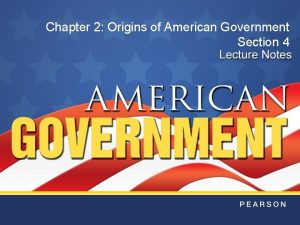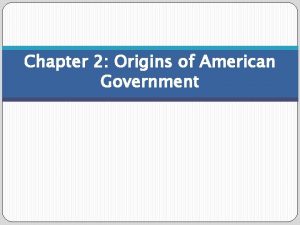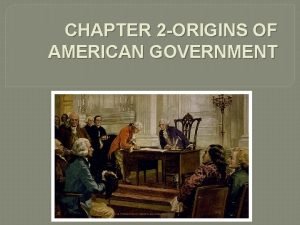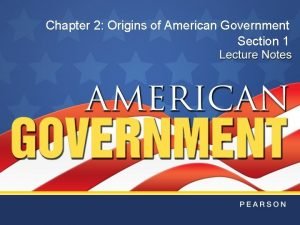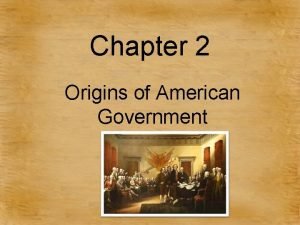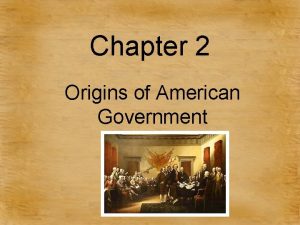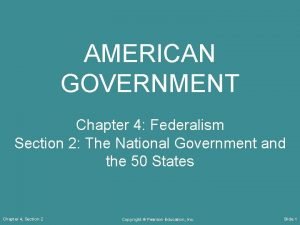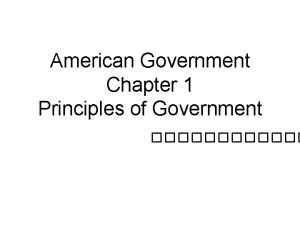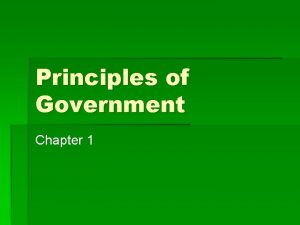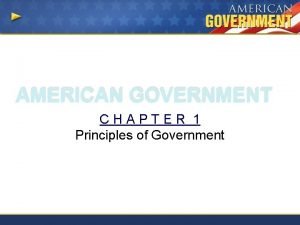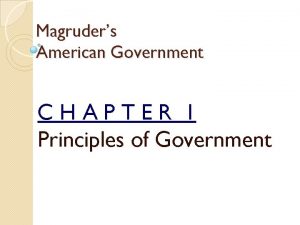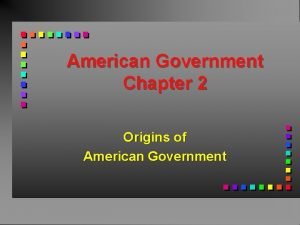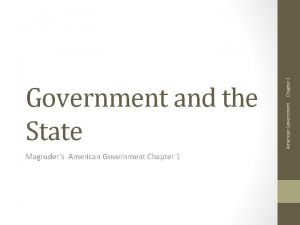American Government Chapter 1 Principles of Government Section











- Slides: 11

American Government Chapter 1: Principles of Government Section 3: Basic Concepts of Democracy

Bellringer • What are the Basic Concepts of Democracy? Democracy

Objectives • Understand the foundations of democracy • Analyze the connections between democracy and the free enterprise system.

Foundations of Democracy • We believe in its concepts • Only survive if we the people continue to subscribe and practice these concepts. • Not perfect – “democracy is the worst form of government except all those other forms that have been tried from time to time” Churchill • 5 concepts of democracy

1) Worth of the Individual • Individuality v. greater good? • We are forced to pay taxes, register for the draft and stop at a stop sign. • Are we forced or do we choose to do these things to live in this democratic society? • When is our individuality subordinate to society?

2) Equality of All Persons Democracy stress equality “All men are created equal. ” What does this mean? We are all equal? Heck NO! We are not born with the same mental or physical abilities – do not have a right to an equal share of worldly good 1) We have equal opportunity to succeed or fail on our own 2) We are all equal under the law (gender, race, color, religion) • We still haven’t accomplished these two. • • •

3) Faith in Majority Rule and an insistence upon Minority Rights • Majority right should be right more often then it will be wrong. • What if they are wrong? • Then we have to protect minority right. • What if a highway wants to go through your farm – the majority needs the highway, can your farm be protected? You are the minority. • Unchecked – Majority rule can destroy democracy. What?

4) Necessity of Compromise • Democracy should be able to compromise to establish the public good (majority view). • We are so different in our opinions, we need compromise. • Not all compromises are good and not all are necessary – sometimes right is right and wrong is wrong.

5) Individual Freedom • Balance between individual freedom (absolute) and government (limited) • Where and how do we draw the line? • Absolute freedom = anarchy. • Authority must never be allowed to become so great that is restricts the individual beyond what is absolutely necessary – (again, where do we draw the line) • Government is limited for safety – (quotes on page 22 and 23)

Duties and Responsibilities of Citizenship Duties -Serving on a jury -Serving as a witness when called -Attending school -Paying taxes -Registering for the draft (men only) -Obeying local, State, and national laws -Respecting the rights of others Responsibilities -Voting -Volunteering -Participating in civic life -Understanding the workings of our government

Democracy and the Free Enterprise System • Enter pic form pdf
 Origins of american government section 4
Origins of american government section 4 Origins of american government section 1
Origins of american government section 1 Origins of american government section 1
Origins of american government section 1 Chapter 2 american government
Chapter 2 american government Chapter 2 origins of american government vocabulary
Chapter 2 origins of american government vocabulary Chapter 2 origins of american government answer key
Chapter 2 origins of american government answer key Chapter 2 origins of american government worksheet answers
Chapter 2 origins of american government worksheet answers Chapter 2 lesson 1 government in colonial america
Chapter 2 lesson 1 government in colonial america Chapter 2 origins of american government
Chapter 2 origins of american government Chapter 4 federalism answer key
Chapter 4 federalism answer key Chapter 1 principles of government
Chapter 1 principles of government Principles of government chapter 1
Principles of government chapter 1
